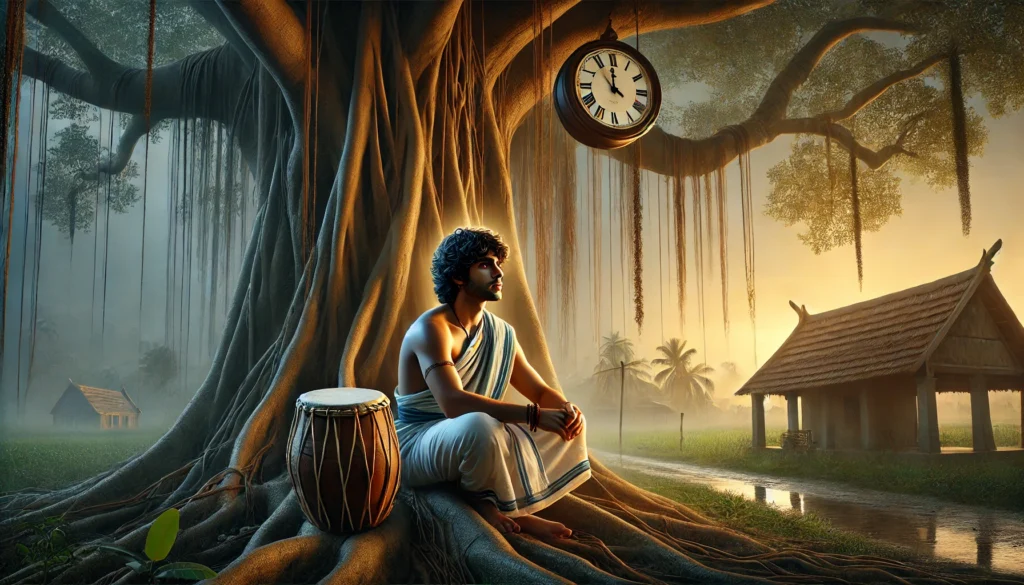Lessons from the Bhagavad Gita for Success
Introduction: The Clock of Life
Imagine a clock ticking steadily in the quiet of a small village in India, its hands moving with a rhythm that seems to echo the heartbeat of the universe. One day, a young man named Arjun sat beneath a banyan tree, staring at this clock, his mind clouded with doubt and impatience. He was waiting for something—success, love, or perhaps a sign from the divine—but it seemed like the world was moving too slowly. Sound familiar? Many of us, especially those standing in the USA, chasing dreams in a fast-paced society, feel this restlessness too.
This story isn’t just about Arjun; it’s about you and me, learning to trust that everything comes to us at the right moment. Let’s embark on a journey inspired by the timeless wisdom of the Bhagavad Gita, weaving a narrative that motivates and guides us toward patience and faith.

The Struggle of Waiting
Arjun’s life, as depicted in the Bhagavad Gita, was no stranger to struggle. A warrior by birth, he faced a daunting battle at Kurukshetra, torn between duty and despair. He questioned Lord Krishna, his charioteer and guide, “Why must I wait? Why does success elude me when I work so hard?” Krishna smiled and shared a profound truth: life is like a river, flowing at its own pace. Sometimes, we paddle furiously, standing in the USA or elsewhere, chasing promotions, relationships, or personal goals, only to find the current pulling us back.
This impatience is a universal human experience. In the USA, where ambition drives millions to work late nights, start businesses, and pursue the American Dream, the pressure to succeed quickly can be overwhelming. Studies show that stress-related illnesses are on the rise, with many attributing it to the constant race against time. But what if the key to unlocking our potential lies not in speeding up, but in slowing down? The Gita teaches us that every moment has its purpose, and with faith in a higher power, all things are possible.
The Wisdom of Krishna: A Story of Surrender
One evening, as the sun dipped below the horizon, Krishna took Arjun aside. “Look at the fields,” he said, pointing to the golden crops swaying in the breeze. “Do they rush to grow? No, they trust the seasons. So must you trust the divine timing.” This lesson struck Arjun deeply. Krishna explained that the soul is eternal, and our earthly struggles are temporary. In Chapter 2, Verse 47 of the Bhagavad Gita, he advises, “You have a right to perform your prescribed duties, but you are not entitled to the fruits of your actions.” This is not a call to inaction but an invitation to detach from outcomes and focus on the effort.
For those standing in the USA, this can be transformative. Whether you’re an entrepreneur launching a startup in Silicon Valley or a student grinding through exams in New York, the pressure to see immediate results can dim your spirit. Krishna’s words remind us to pour our hearts into our work—be it coding, teaching, or building communities—without clinging to the clock. The right moment will arrive when the universe aligns, much like the harvest comes when the season is ripe.
The Power of Faith
Faith, as Krishna emphasizes, is the anchor in stormy seas. Arjun learned to surrender his fears, trusting that a higher power orchestrated his path. This doesn’t mean sitting idly; it means acting with dedication while releasing the burden of control. In the USA, where individualism often reigns, this concept might feel foreign. Yet, millions find solace in spirituality—whether through yoga, meditation, or prayer—echoing the Gita’s call to connect with the divine.
Consider Sarah, a young woman from Chicago, standing in the USA with big dreams. She wanted to open a bakery but faced setback after setback—loans denied, ovens breaking, and customers slow to come. Frustrated, she stumbled upon the Gita’s teachings in a local library. Inspired, she began each day with a simple prayer: “Guide me, and I will trust your timing.” Months later, a viral social media post about her unique recipes turned her fortunes around. Her story mirrors Arjun’s—faith transformed her waiting into a powerful catalyst for success.

Patience: The Silent Virtue
Patience is the silent virtue that often goes unnoticed. Krishna told Arjun, “The wise work for the welfare of the world, without thought for themselves” (Chapter 3, Verse 25). This selfless action, done with patience, builds a foundation for lasting achievement. In the USA, where instant gratification is king—think fast food, same-day deliveries, and social media fame—cultivating patience can feel like a rebellion. Yet, it’s a rebellion worth waging.
Take the example of a tech innovator in Seattle, tirelessly developing an app to connect volunteers with charities. Years passed with little recognition, but he persisted, inspired by the Gita’s call to duty over reward. When his app finally launched, it gained traction, standing in the USA as a beacon of social good. His patience paid off, proving that the right moment often follows a season of quiet perseverance.
Integrating the Gita’s Lessons into Daily Life
How can we, standing in the USA, weave these ancient teachings into our modern lives? Start small. Begin your day with a moment of reflection—perhaps reading a verse from the Gita or simply breathing deeply to center yourself. When deadlines loom or rejections pile up, remind yourself of Krishna’s words: the outcome is not yours to force. Focus on the process, whether you’re crafting code, writing a novel, or raising a family.
Community plays a role too. In the USA, where diversity thrives, joining a study group or meditation circle can deepen your understanding of these principles. Share stories like Arjun’s with friends, inspiring each other to stand firm in faith. The Gita teaches that we are part of a larger whole—our actions ripple outward, affecting others in ways we may not see immediately.
Overcoming Doubt with Divine Support
Doubt is a shadow that follows us all. Arjun faced it on the battlefield, and we face it in boardrooms, classrooms, and homes across the USA. Krishna’s response was clear: “Abandon all varieties of religion and just surrender unto Me. I shall deliver you from all sinful reactions” (Chapter 18, Verse 66). This surrender isn’t weakness; it’s a powerful act of trust in the divine plan.
For someone standing in the USA, this might mean letting go of the need to control every detail of a career move or personal goal. When a job interview goes awry or a business deal falls through, instead of spiraling, pause and affirm: “With God, all things are possible.” This mindset shift can turn setbacks into stepping stones, as countless individuals have discovered through prayer and meditation.

The Right Moment Arrives
As Arjun fought his battle, victory came not when he demanded it, but when he aligned with his dharma—his true purpose. The clock he once stared at no longer taunted him; it became a symbol of hope. In the USA, where time often feels like an enemy, we can reframe it as an ally. Whether you’re an artist in Los Angeles awaiting a breakthrough or a parent in Texas nurturing a child’s future, the right moment is on its way.
The Bhagavad Gita assures us that life’s timing is perfect, even when it feels imperfect. Stories of resilience—Arjun’s, Sarah’s, the tech innovator’s—remind us that patience and faith unlock doors we didn’t know existed. So, stand tall, breathe deeply, and trust. Everything comes to you at the right moment. Be patient, have faith, and with God, all things are possible.
Conclusion: A Call to Action
As we close this journey, let’s carry forward the Gita’s wisdom. Standing in the USA, amid its hustle and dreams, let’s embrace the clock of life with open hearts. Act with purpose, surrender with grace, and wait with hope. Write your own story of triumph, inspired by Arjun’s transformation. Share this message with others—through conversations, blogs, or acts of kindness—and watch how it spreads. The right moment is not a destination; it’s a state of being, cultivated through faith and patience. With the divine as your guide, your greatest victories await.
What is the main lesson from the Bhagavad Gita about timing in life?
The Bhagavad Gita teaches that everything comes at the right moment when we practice patience and faith. It emphasizes surrendering to divine timing, as seen in Krishna’s guidance to Arjun, encouraging focus on duty rather than immediate results, which is especially relevant for those standing in the USA chasing their dreams.
How can the Bhagavad Gita help with stress in a fast-paced environment like the USA?
The Gita offers tools like detachment from outcomes and trust in a higher power to reduce stress. By adopting practices such as daily reflection or meditation, individuals in the USA can manage the pressure of fast-paced life, turning challenges into opportunities for growth, as illustrated by real-life examples in the article.
What does it mean to surrender according to the Bhagavad Gita?
Surrender, as per Chapter 18, Verse 66, means letting go of ego and control, trusting the divine plan. For those standing in the USA, this can translate to persisting in work or personal goals without obsessing over results, fostering resilience and peace amidst setbacks.
How can someone apply Bhagavad Gita principles in their daily life in the USA?
One can start with morning reflection, focus on effort over rewards, and join community groups for support. The article highlights stories like Sarah’s bakery success, showing how faith and patience, inspired by the Gita, can lead to fulfillment in diverse American contexts.
Why is patience important for success, according to the Bhagavad Gita?
Patience is key as it aligns us with life’s natural rhythm, as Krishna advises Arjun to trust the seasons. For those standing in the USA, this virtue supports long-term success in careers or personal projects, with examples like the Seattle tech innovator proving its value in achieving lasting impact.